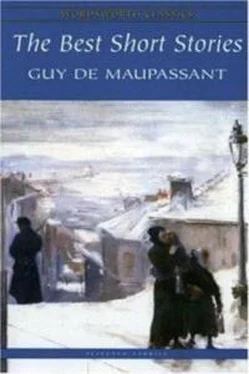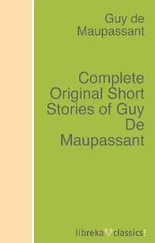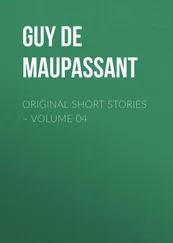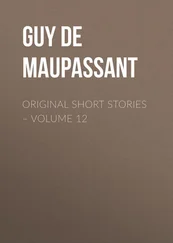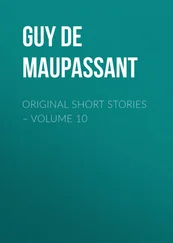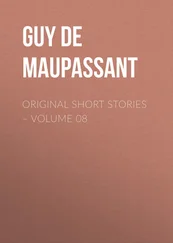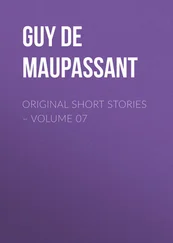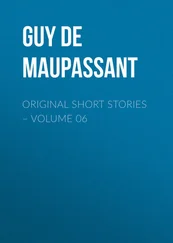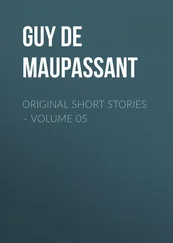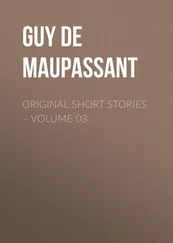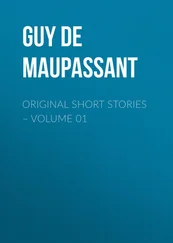As soon as he saw me he began to cry. Stretching out his arms to his mother, he cried:
"It was not my fault, mamma, it was not my fault. I was asleep, and I fell off. Do not scold me, it was not my fault."
I turned to the woman and said:
"What does this mean?"
She seemed confused and worried, and said in a broken voice:
"What do you want me to do? I do not earn enough to put him to school! I have to keep him with me, and I cannot afford to pay for another room, by heavens! He sleeps with me when I am alone. If any one comes for one hour or two he can stay in the wardrobe; he keeps quiet, he understands it. But when people stay all night, as you have done, it tires the poor child to sleep on a chair.
"It is not his fault. I should like to see you sleep all night on a chair—you would have something to say."
She was getting angry and excited and was talking loud.
The child was still crying. A poor delicate timid little fellow, a veritable child of the wardrobe, of the cold, dark closet, a child who from time to time was allowed to get a little warmth in the bed if it chanced to be unoccupied.
I also felt inclined to cry.
And I went home to my own bed.
The Mountain Pool
Saint Agnes, May 6.
MY DEAR FRIEND:
You asked me to write to you often and to tell you in particular about the things I might see. You also begged me to rummage among my recollections of travels for some of those little anecdotes gathered from a chance peasant, from an innkeeper, from some strange traveling acquaintance, which remain as landmarks in the memory. With a landscape depicted in a few lines, and a little story told in a few sentences you think one can give the true characteristics of a country, make it living, visible, dramatic. I will try to do as you wish. I will, therefore, send you from time to time letters in which I will mention neither you nor myself, but only the landscape and the people who move about in it. And now I will begin.
Spring is a season in which one ought, it seems to me, to drink and eat the landscape. It is the season of chills, just as autumn is the season of reflection. In spring the country rouses the physical senses, in autumn it enters into the soul.
I desired this year to breathe the odor of orange blossoms and I set out for the South of France just at the time that every one else was returning home. I visited Monaco, the shrine of pilgrims, rival of Mecca and Jerusalem, without leaving any gold in any one else's pockets, and I climbed the high mountain beneath a covering of lemon, orange and olive branches.
Have you ever slept, my friend, in a grove of orange trees in flower? The air that one inhales with delight is a quintessence of perfumes. The strong yet sweet odor, delicious as some dainty, seems to blend with our being, to saturate us, to intoxicate us, to enervate us, to plunge us into a sleepy, dreamy torpor. As though it were an opium prepared by the hands of fairies and not by those of druggists.
This is a country of ravines. The surface of the mountains is cleft, hollowed out in all directions, and in these sinuous crevices grow veritable forests of lemon trees. Here and there where the steep gorge is interrupted by a sort of step, a kind of reservoir has been built which holds the water of the rain storms.
They are large holes with slippery walls with nothing for any one to grasp hold of should they fall in.
I was walking slowly in one of these ascending valleys or gorges, glancing through the foliage at the vivid–hued fruit that remained on the branches. The narrow gorge made the heavy odor of the flowers still more penetrating; the air seemed to be dense with it. A feeling of lassitude came over me and I looked for a place to sit down. A few drops of water glistened in the grass. I thought that there was a spring near by and I climbed a little further to look for it. But I only reached the edge of one of these large, deep reservoirs.
I sat down tailor fashion, with my legs crossed under me, and remained there in a reverie before this hole, which looked as if it were filled with ink, so black and stagnant was the liquid it contained. Down yonder, through the branches, I saw, like patches, bits of the Mediterranean gleaming so that they fairly dazzled my eyes. But my glance always returned to the immense somber well that appeared to be inhabited by no aquatic animals, so motionless was its surface. Suddenly a voice made me tremble. An old gentleman who was picking flowers—this country is the richest in Europe for herbalists—asked me:
"Are you a relation of those poor children, monsieur?"
I looked at him in astonishment.
"What children, monsieur?"
He seemed embarrassed and answered with a bow:
"I beg your pardon. On seeing you sitting thus absorbed in front of this reservoir I thought you were recalling the frightful tragedy that occurred here."
Now I wanted to know about it, and I begged him to tell me the story.
It is very dismal and very heart–rending, my dear friend, and very trivial at the same time. It is a simple news item. I do not know whether to attribute my emotion to the dramatic manner in which the story was told to me, to the setting of the mountains, to the contrast between the joy of the sunlight and the flowers and this black, murderous hole, but my heart was wrung, all my nerves unstrung by this tale which, perhaps, may not appear so terribly harrowing to you as you read it in your room without having the scene of the tragedy before your eyes.
It was one spring in recent years. Two little boys frequently came to play on the edge of this cistern while their tutor lay under a tree reading a book. One warm afternoon a piercing cry awoke the tutor who was dozing and the sound of splashing caused by something falling into the water made him jump to his feet abruptly. The younger of the children, eight years of age, was shouting, as he stood beside the reservoir, the surface of which was stirred and eddying at the spot where the older boy had fallen in as he ran along the stone coping.
Distracted, without waiting or stopping to think what was best to do, the tutor jumped into the black water and did not rise again, having struck his head at the bottom of the cistern.
At the same moment the young boy who had risen to the surface was waving his stretched–out arms toward his brother. The little fellow on land lay down full length, while the other tried to swim, to approach the wall, and presently the four little hands clasped each other, tightened in each other's grasp, contracted as though they were fastened together. They both felt the intense joy of an escape from death, a shudder at the danger past.
The older boy tried to climb up to the edge, but could not manage it, as the wall was perpendicular, and his brother, who was too weak, was sliding slowly towards the hole.
Then they remained motionless, filled anew with terror. And they waited.
The little fellow squeezed his brother's hands with all his might and wept from nervousness as he repeated: "I cannot drag you out, I cannot drag you out." And all at once he began to shout, "Help! Help!" But his light voice scarcely penetrated beyond the dome of foliage above their heads.
They remained thus a long time, hours and hours, facing each other, these two children, with one thought, one anguish of heart and the horrible dread that one of them, exhausted, might let go the hands of the other. And they kept on calling, but all in vain.
At length the older boy, who was shivering with cold, said to the little one: "I cannot hold out any longer. I am going to fall. Good–by, little brother." And the other, gasping, replied: "Not yet, not yet, wait."
Evening came on, the still evening with its stars mirrored in the water. The older lad, his endurance giving out, said: "Let go my hand, I am going to give you my watch." He had received it as a present a few days before, and ever since it had been his chief amusement. He was able to get hold of it, and held it out to the little fellow who was sobbing and who laid it down on the grass beside him.
Читать дальше
